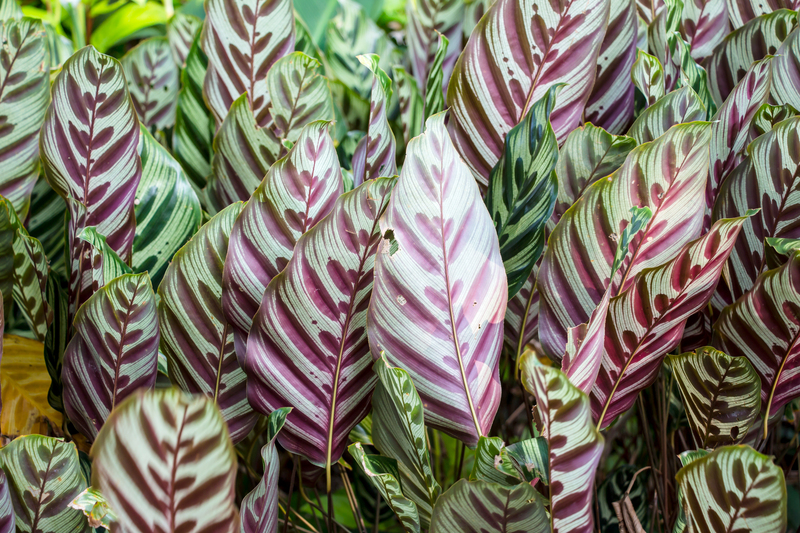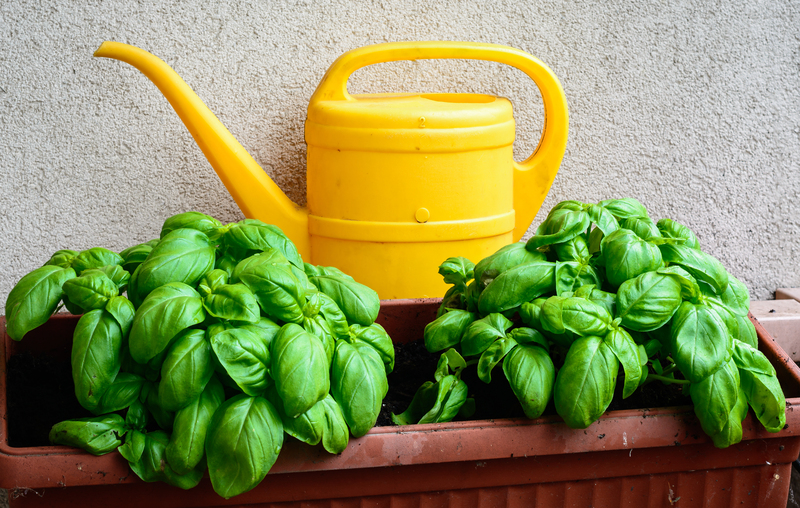Recycling Waste into Fertility Gold
Posted on 23/08/2025
Recycling Waste into Fertility Gold: Transforming Trash into Treasure
In an ever-changing world, environmental concerns are at the forefront of daily life. As we search for innovative ways to reduce our ecological footprint, recycling waste into fertility gold emerges as a crucial solution. What does this concept involve? Essentially, it means turning everyday waste-- organic material, food scraps, yard trimmings--into rich, valuable fertilizer that nourishes the soil and supports sustainable agriculture.
Understanding the Importance of Waste-to-Fertility Transformation
Every year, millions of tons of organic waste end up in landfills. This waste, if left untreated, generates methane gas, a potent greenhouse emission. However, by converting organic waste into compost, we can spearhead a movement towards a greener planet, decrease landfill volume, and foster soil enrichment.
Why does recycling waste matter? Here are a few points that put the significance into perspective:
- Reduces landfill usage and associated environmental problems.
- Decreases reliance on chemical fertilizers, making farming more sustainable.
- Enhances the structure, water retention, and nutrients of agricultural soils.
- Lower greenhouse gas emissions as organic matter breaks down naturally.
- Supports a circular economy, transforming waste into a valuable resource.
Types of Waste That Can Be Recycled into Fertilizer Gold
Not all waste is created equal. Understanding the various sources that can be recycled into nutrient-dense compost is essential:
- Kitchen Waste: Fruit and vegetable peels, coffee grounds, eggshells, tea bags.
- Garden/Yard Waste: Grass clippings, leaves, twigs, spent plants.
- Animal Manure: A potent source of nitrogen and phosphorus, especially from herbivores.
- Crop Residue: Stalks, husks, and other remnants after harvest.
- Paper Products: Unbleached paper towels, napkins, and newsprint (in moderation).

The Process of Recycling Organic Waste Into Fertility Gold
Composting: The Heart of Fertility Gold Creation
Composting is the most popular and accessible method for transforming organic waste into rich fertilizer. Through the composting process, bacteria, fungi, and other microorganisms break down organic matter into a dark, crumbly product known as "black gold" due to its immense value for soil health.
The stages of composting:
- Collection: Gather suitable organic waste from households, farms, and gardens.
- Preparation: Chop larger items to smaller sizes, avoid meat/dairy/oils which can attract pests.
- Layering: Alternate between carbon-rich "browns" (leaves, paper) and nitrogen-rich "greens" (kitchen waste, grass clippings).
- Moisture: Maintain dampness similar to a wrung-out sponge.
- Aeration: Turn the pile regularly to supply oxygen, which speeds decomposition.
- Curing: Allow the compost to fully break down (8-12 weeks on average) before use.
Vermicomposting: Harnessing the Power of Worms
Vermicomposting is a specialized form of composting where earthworms consume waste and produce castings-- a concentrated form of nutrient-rich fertilizer. This process is particularly efficient for apartment dwellers or areas with limited space.
- Red wigglers are most commonly used for household vermicomposting bins.
- Worm castings contain high levels of nitrogen, phosphorus, and potassium, making them excellent soil amendments.
Bokashi: Fermentation-Based Fertility Gold
Originating from Japan, Bokashi uses effective microorganisms (EM) to ferment organic waste, including items typically excluded from compost (e.g., dairy, meat). This anaerobic process yields a pre-compost material that breaks down even further once added to soil.
- Bokashi buckets are closed systems, preventing odors and pests.
- Fermented waste can be buried directly in the soil or added to traditional compost piles.
Benefits of Turning Waste Into Agricultural Gold
Environmental Advantages
By recycling waste to produce natural fertilizer, we actively reverse the damage caused by chemical inputs and non-renewable resource depletion:
- Reduces chemical runoff: Organic fertilizers do not leach harmful substances into waterways.
- Sequesters carbon: Enriched soils hold more carbon, helping combat climate change.
- Supports healthy microbial life: Aids plant resilience, natural pest resistance, and biodiversity.
- Reduces greenhouse gases: Diverting organic waste from landfills cuts down hazardous emissions.
Agronomic and Economic Gains
Converting household and farm waste into fertilizer gold supports local economies and creates positive change on the farm:
- Reduces input costs: Farmers spend less on commercial fertilizers when using composted waste.
- Builds resilient soils: Organically enriched soils retain moisture, reduce erosion, and yield healthier crops.
- Promotes circular economy: Closing the loop between waste and food production reduces dependency on imported resources.
- Increases farm profitability: Healthier crops often fetch better prices at market.
Healthier Food, Healthier Communities
Soils alive with recycled organic matter produce food that is higher in nutrients. When communities invest in food systems that rely on waste-to-fertilizer recycling, they reap:
- Enhanced food security through sustained crop yields.
- Reduced exposure to synthetic chemicals in food.
- Cleaner neighborhoods due to reduced waste volume and landfill odors.
Best Practices for Home and Community Composting
Getting Started at Home
You don't need acres of land to turn organic waste into fertile compost. Here's how you can begin in your backyard or even on a balcony:
- Select a composting method: Choose between traditional compost piles, tumblers, vermicompost bins, or bokashi systems.
- Educate household members: Make sure everyone knows what can--and cannot--go into the compost system.
- Monitor moisture and aeration: Too dry or too wet will slow the process; regular turning or mixing is key.
- Keep an eye on balance: Browns (carbon) and greens (nitrogen) need to be layered for best results. Too much green leads to odors, too much brown leads to slow decomposition.
- Harvest at maturity: Compost is ready when it is dark, crumbly, and sweet-smelling.
Community Composting Initiatives
Many urban residents may not have space for home composting--but community composting bridges this gap.
- Shared compost hubs: Groups of neighbors or community gardens collect organic waste for central processing.
- Municipal programs: Curbside organics pickup sends food and green waste to city-run compost facilities.
- Educational campaigns: Schools and NGOs help citizens understand the value of waste recycling, teaching proper sorting and composting techniques.
Common Challenges and How to Overcome Them
Odor and Pest Problems
Smelly compost? This is usually due to excess moisture, poor aeration, or inclusion of forbidden items (like meat, dairy, or oil). The solution:
- Add more browns: Dry leaves, paper, or shredded cardboard absorb extra moisture.
- Increase turning frequency: Oxygen is crucial for aerobic decomposition.
- Elevate or secure bins: Prevents rodents and larger pests from entering.
Slow Decomposition
Compost taking too long? A few quick fixes can help ensure your waste-to-fertility process stays efficient:
- Chop material small: Smaller pieces break down faster.
- Monitor moisture: Too dry slows microbial breakdown; too wet causes anaerobic conditions.
- Balance carbon and nitrogen: Aim for a 30:1 C:N ratio as closely as possible.
Contamination
Plastic, glass, and metals do not belong in compost. They contaminate the final product and can damage soil health.
- Careful sorting: Train all participants to only add compostable materials.
- Strict oversight in community programs ensures cleaner compost outputs.
Innovations in Recycling Waste into Fertility Gold
Tech Solutions for Urban Organic Recycling
As cities grow, so does the volume of waste generated. Thankfully, technology-driven approaches are making urban composting more efficient:
- Smart Bins: Sensors help track bin fill levels, contamination, and temperature for optimized pickups and maintenance.
- Composting Apps: Inform residents of collection schedules, proper composting methods, and local drop-off points.
- Decentralized digesters: Small-scale anaerobic machines convert food waste into biogas and liquid fertilizers in urban centers.
Agro-Industrial Waste Upcycling
Large farms and food processors generate significant waste volumes. The latest recycling innovations include:
- Biochar: Pyrolysis transforms crop residues into biochar, a soil amendment that enhances nutrient retention and sequesters carbon.
- Anaerobic digesters: Facilities create biogas for energy and nutrient-rich sludge as liquid fertilizer.
- Peat replacements: Compost-based products reduce reliance on environmentally damaging peat moss.

The Future of Fertility Gold: Closing the Loop
As more communities, farmers, and individuals embrace recycling waste into natural fertilizer, we edge closer to a truly circular food system. Here are some global trends driving the transition:
- Government incentives: Policies encourage food producers and consumers to reduce, recycle, and return nutrients to the earth.
- Zero waste movements: Households and businesses commit to diverting as much waste as possible from landfills.
- Education: The rise of urban gardening, farm-to-table, and regenerative agriculture increases compost literacy.
- Innovation funding: Startups and research initiatives develop next-generation composting and nutrient recovery solutions.
Conclusion: Your Role in Creating Fertility Gold
Whether you're an urban dweller or a countryside farmer, you have the power to turn organic waste into a resource that supports life. By committing to recycling your waste into fertility gold, you join a growing movement toward healthier soils, abundant crops, cleaner cities, and a sustainable future. Start small, educate yourself and your community, and watch as your composting efforts create a ripple effect of ecological benefits. Remember: Every banana peel, coffee ground, and leaf can be a building block for healthier soil and a thriving planet.
```Latest Posts
Gardening Tricks to Tackle Excessive Wind Challenges
Mastering the Art of Hedge Trimming with Unique Shapes
Designing a Safe and Fun Outdoor Space for Children

